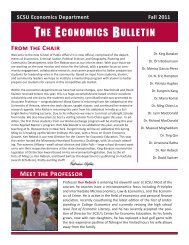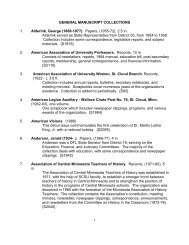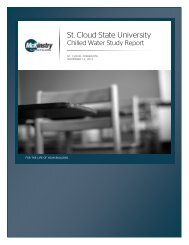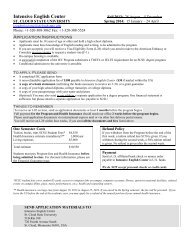2008 Proceedings - St. Cloud State University
2008 Proceedings - St. Cloud State University
2008 Proceedings - St. Cloud State University
Create successful ePaper yourself
Turn your PDF publications into a flip-book with our unique Google optimized e-Paper software.
Abstracts<br />
Session K Helping People Succeed Lady's Slipper<br />
Teaching Lingua Franca English in a Baroque Inner-City Contact Zone: Negotiating Basic Literacy With/For Working-Class<br />
Adolescents in India<br />
Teaching English in India to struggling working-class Bengali students at an award-winning democratically-inclusive English-medium<br />
school tests many hallowed ideals. Given the ten "naughtiest" girls in the school, I was asked to create appropriate curricula for others like<br />
them from non-English-speaking families lacking the cultural capital to access mainstream resources. While the reasons for these orallyfluent<br />
students' failures to read and write remained a mystery (attention-deficit, malnutrition, broken homes, illiterate parents, class<br />
conflict?), constructing a more culturally-familiar multilingual lingua-franca (LFE) environment for them made English more accessible.<br />
Amidst educators who spoke Irish, British, Australian, Dutch, as well as Indian English, my Western-US accent and Pakistani upbringing<br />
afforded me a unique entry-point into this baroque environment that also facilitated/fostered/mediated an LFE approach. Jointly deploying<br />
our marginal identities, my students and I fashioned a pedagogical safehouse amidst competing Euro-liberal, Bengali-nationalist, and Irish-<br />
Catholic claims on their identities, needs, and potentials. The sociolinguistic concept of 'alignment' helps explain how this pedagogy<br />
worked. Following Atkinson and Canagarajah, I describe my students' oral (LFE) skills as assets that fit well with a modified CLT taskbased<br />
curriculum framed within an adaptive special-education approach. After years struggling within an alienating formal exam system,<br />
this structured-yet-negotiable environment rewarded 'alignment alone.' Graded solely on sustained ‗effort to connect‘ evidenced by<br />
immediately-bankable points, the students could focus their attention on writing as a meaning-making process. Together, we wrote texts on<br />
the blackboard, reinventing English from below-through sentence-combining, language-experience, and cultural 're-writes.' The resulting<br />
texts helped teach reading/grammar too. Banking on underappreciated strengths, the students gradually stopped evading difficulties and<br />
invested more in themselves. Locating my classroom within Kolkata's neo-baroque society, this first-ever attempt to develop remedial pullout<br />
methods for the school's burgeoning population of working-class students both affirms and extends the school's democratic languagepolicy<br />
agenda, engaging the tensions between lower and lower-middle-classes.<br />
Presentation Index: K2<br />
Time: 11:20 a.m.<br />
Department: Special Education; English as a Second LanguagE<br />
Project Sponsor(s):<br />
<strong>St</strong>udent Presenter(s): Fonken, Gael<br />
Salk, Janet; Veeder, Rex<br />
Social Skills Training to Teach Abuse Prevention for an Adult with Developmental Disabilities<br />
The purpose of this research is to teach abuse prevention skills to an adult with developmental disabilities. Prior to intervention conditions,<br />
the participant repeatedly agreed to go places, give hugs and divulge personal information including social security and phone numbers to<br />
strangers. This behavior resulted in the participant being vulnerable to abuse and prevented him from successful community integration<br />
and independent social mobility. Three social vignettes were designed to address the three punitive vulnerable scenarios. Persons<br />
unknown to the participant agreed to act as strangers and solicited the participant. Following intervention, the participant was able to<br />
demonstrate the skills needed to avoid and properly report situations that may result in physical, sexual and financial abuse. Our research<br />
has provided the participant with the skills necessary for increased independence in the community, and therefore, a higher quality of life.<br />
Results are discussed as being consistent with the goals of applied behavior analysis to effect meaningful improvement in behaviors that<br />
are important to the participant in his/her natural environment.<br />
Presentation Index: K3<br />
Time: 11:40 a.m.<br />
Department: Community Psychology<br />
Project Sponsor(s):<br />
<strong>St</strong>udent Presenter(s): Vesel, Shawn<br />
Edrisinha, Chaturi<br />
Female Entrepreneurs in Africa: The Road to Capital Challenged by Inequality<br />
As the dawn of globalization arises upon the twenty-first century, the unification of industrialized and third world countries is inventible.<br />
Individual competition for survival is dwindling amidst the powerful control of large corporations depicting the image of poverty and<br />
suffering. Within the competition for survival, women will be at the bottom for opportunity and economic advancement on a global scale.<br />
A gender hierarchy will dominate the social relationships of women due to a lack of economic opportunities, creating internal conflicts and<br />
discrimination among women in the industrial and non-industrial. Therefore, discrimination and exploitation are inventible. Historically, the<br />
subordination and denigration of women occurred from stratification of domesticated jobs versus economic jobs, as result women have<br />
been overworked, underpaid, and institutionalized to perpetuate the prophecy. The expansion of globalization maximizes the exploitation of<br />
females in non-industrial countries, attributing to the global denigration of social equality and achievement among women in both industrial<br />
and non-industrial countries. This paper briefly discusses effects of globalization on gender stratification of women entrepreneurs in<br />
African: discussing the positive and negative from feminist perspective, with three diverse case studies on female entrepreneurs in<br />
Zimbabwe, South Africa, and Kenya. The root of gender inequality for female entrepreneurs lies at the belly of historical and cultural<br />
values. These three women stories highlight the road to capital is challenged by inequality.<br />
Presentation Index: K4<br />
Time: 12:00 p.m.<br />
Department: Women's <strong>St</strong>udies<br />
Project Sponsor(s):<br />
<strong>St</strong>udent Presenter(s): Mason, Keesha<br />
Mboko, Swithina<br />
<strong>St</strong>. <strong>Cloud</strong> <strong>St</strong>ate <strong>University</strong> <strong>St</strong>udent Research Colloquium 45<br />
April 22, <strong>2008</strong>
















